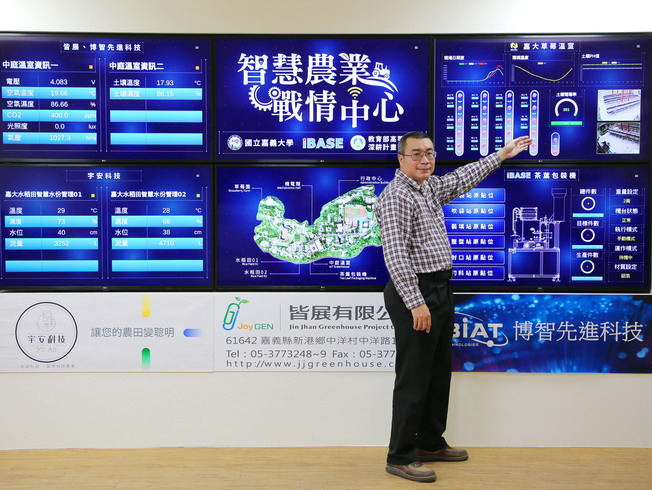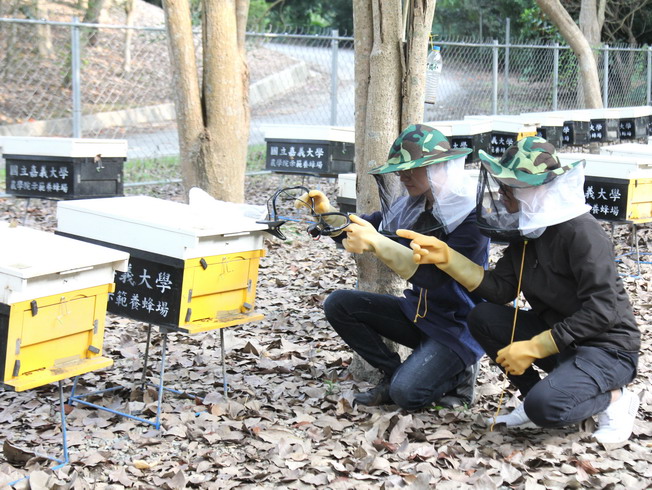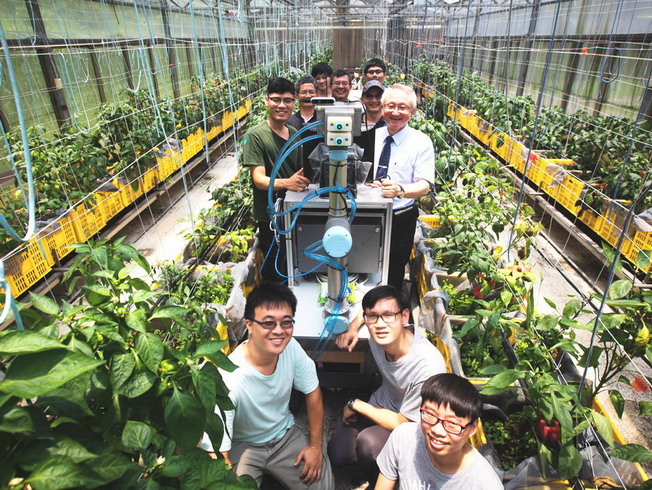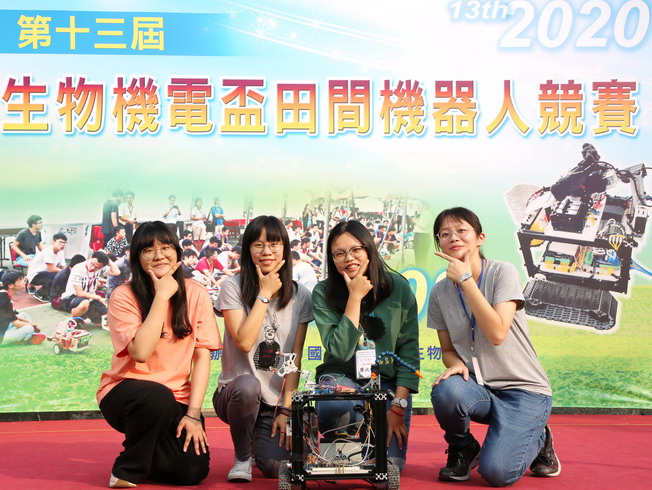 To integrate smart technology and agricultural production in conjunction with the “smart agriculture 4.0” policy of the Council of Agriculture, National Chiayi University founded the Intelligent Agriculture Research Center in 2018 by integrating the professional knowledge and technology across domains. They have been adopting smart technology to enhance the agricultural production, adjust agricultural production management methods, and strengthen research and development related to scientific and technological innovation. By establishing a link among industry, government and academia, they hope to nurture smart technology professionals, and assist the industry in fostering smart agricultural technology. In the past two years, the NCYU teacher team has demonstrated remarkable achievements in research and development on smart agricultural technology. Their achievements included the Sweet Pepper Plant Protection Robot, field robots, drones for image identification of crops and soil monitoring, and pest diagnosis and control, and smart animal husbandry and aquaculture production system. In 2020, the first concrete drone license test site run by a university in southern Taiwan opened. By offering professional courses for drone operation, it has trained more than 500 people who were later certified for drone operation. The university is committed to AI smart agriculture research, hoping to contribute to Taiwan’s agricultural development and fulfill its social responsibility as a local university.
To integrate smart technology and agricultural production in conjunction with the “smart agriculture 4.0” policy of the Council of Agriculture, National Chiayi University founded the Intelligent Agriculture Research Center in 2018 by integrating the professional knowledge and technology across domains. They have been adopting smart technology to enhance the agricultural production, adjust agricultural production management methods, and strengthen research and development related to scientific and technological innovation. By establishing a link among industry, government and academia, they hope to nurture smart technology professionals, and assist the industry in fostering smart agricultural technology. In the past two years, the NCYU teacher team has demonstrated remarkable achievements in research and development on smart agricultural technology. Their achievements included the Sweet Pepper Plant Protection Robot, field robots, drones for image identification of crops and soil monitoring, and pest diagnosis and control, and smart animal husbandry and aquaculture production system. In 2020, the first concrete drone license test site run by a university in southern Taiwan opened. By offering professional courses for drone operation, it has trained more than 500 people who were later certified for drone operation. The university is committed to AI smart agriculture research, hoping to contribute to Taiwan’s agricultural development and fulfill its social responsibility as a local university.
AI Robots Assist Farming Practices to Relieve Labor Shortages in Agriculture
According to the Council of Agriculture, Executive Yuan, Taiwan suffers an average of 30% agricultural loss due to various biological disasters. To reduce the amount of pesticides used and the harm to farmers during its application, Prof. Chyung Ay from the Department of Biomechatronic Engineering led his team to establish a sweet pepper pest image recognition system. Using AI deep learning, complete with a six-axis robotic arm and Faster R-CNN neural network, the system helps achieve the highest control with the lowest application rate. In response to the aging population and labor shortages in Taiwan’s rural communities, Prof. Huaang-Youh Hurng and Associate Prof. Huang Wei-Jen from the department utilized IoT control, crawler vehicles, robotic arms and artificial intelligence applications in developing self-propelled field robots, which can help reduce labor work and alleviate labor shortages in agriculture. In the new era of women empowerment, the domain of mechanical engineering is no longer dominated by males. The female team consisting of Zeng Yu-Ru, Zhang Jia-Rong, Liao Yuan-Xuan and Huang Pin-Zhen, students of the NCYU Department of Biomechatronic Engineering, came in first place with a perfect score at the National Bio-Industrial Mechatronics Cup of Field Robot Contest 2020, in its 13th edition. Their outstanding performance has outshined many male students from various colleges and universities.
Saving Water with Smart Irrigation System in Water Scarcity Crisis
With little winter precipitation in Taiwan, there were eight droughts and four irrigation suspensions and fallows from 2002 to 2020. Irrigation was suspended for the first crop of rice due to water scarcity in 2021 owing to the water scarcity crisis. As crop production is affected by climate change, Chen Qing-Tian, Chairman of the Department of Civil and Water Resources Engineering, employed the IoT technology to build a smart irrigation system to reduce the use of water. The system can be used to estimate field irrigation water demand in real time by means of monitoring components for water-saving management. By controlling the device via APP and computer, it is expected to effectively improve the utilization and deployment of water resources.
Remote Monitoring Combined with Computer Deep Learning Technology: Making the Complicated Simple
The cross-domain teacher-student team of NCYU has been working together to build a smart chicken poultry farm for real-time remote monitoring. By detecting chickens with YOLOv4, and determining whether the chickens’ clustering status is normal with clustering algorithm, it is expected to help improve work efficiency of the poultry farmers. To reduce losses with earlier diagnosis and treatment, they developed the technology for poultry health detection and identification with multiple detection and the target detection algorithm “You Only Look Once” (YOLO). Computer vision and deep learning technology were employed to carry out chicken counting, individual chicken tracking and weight estimation. It is expected to effectively collect growth data in order to adjust the breeding environment and increase the chicken production capacity. Furthermore, in terms of aquaculture, the teachers and students collaborated to develop the fish fingerlings calculation technology which utilizes machine learning and image recognition, which helps fishermen count the number of fish fingerlings in a time- and labor-saving way.
Training of Drone Operators and Drone Application: The Dream of Technological Agriculture Will Soon Comes True
The Special Chapter for Drone of the Civil Aviation Act came into effect in April 2020. Since 2019, NCYU has been offering a technical training and examination program for drone pesticide spray technicians at the behest of Agricultural Drug Toxicology Laboratory and Bureau of Animal and Plant Health Inspection and Quarantine, Council of Agriculture, Executive Yuan. The program has trained 443 people who were later licensed by the Agricultural Drug Toxicology Laboratory from 2019 to 2020. The drone license test site is a four-block test site for unmanned helicopters and multi-rotor aircraft of different levels, opened on Augest, 31st, 2020. Located on the west side of Chun-Huei Bridge, it was the first concrete drone license test site built by a university in Taiwan. So far, about 125 trainees have obtained certificates of Ib-GPS and attitude mode (15-25KG) from the Civil Aviation Administration. The NCYU teacher team is also committed to shooting aerial images for land-use-related research with drones. They have made highly precise terrain elevations with aerial imaging from multicopter drones, thermal imaging and multi-spectral imaging. These can be used to explore the land use and interpret the bare land. By obtaining real-time pictures for disaster assessment when natural disasters occur, it is expected to reduce the impact of disasters. It can also be used to estimate crop yields and market prices, thus saving time and costs of investigation.
Smart Agriculture Command Center System: Opening a New Chapter in Agriculture
NCYU worked with iBase Technology Inc. in co-founding the Smart Agriculture Command Center System, in May of 2020. This academic-industrial cooperation project encompasses NCYU expertise in agricultural development and the technology of emerging Internet of Things (IoT). By integrating cultivation and management information regarding the greenhouse and other NCYU’s smart agricultural production facilities for aquaculture, animal and rice, among others, they conduct big data analysis on agriculture with remote monitoring system, and explore the optimum cultivation conditions for agricultural production. They hope to create a visible integrated structure on smart agriculture, achieve optimal agricultural production conditions, and construct an innovative business model.
Program on Smart Agricultural Industry: Training Diversified Skills
As technology is key to future development of agriculture, it has become more and more popular to apply artificial intelligence technology to various fields. The Intelligent Agriculture Research Center was founded at NCYU to facilitate the training of intelligent production and digital service skills for the “new agriculture.” In 2019, the program on the smart agricultural industry was opened to nurture cross-domain professionals in smart agriculture. In October of 2020, student teams of NCYU participated in the AioT Makerathon Design Contest, held by the Chiayi City Government. The student team Mid-October, consisting of Xu Wei-Chen, Chen Jun-Yu, Wang Xiang-Wen, Zhang He-Kai, and Chen Kang-Qi from the Department of Biomechatronic Engineering, came in first place with “Sweet Pepper Garden Output Estimation System with UAV Aerial Photography.” The SIMPLETE team, formed by Fang Yu-Xuan, Liao Ting-Rou, Zhang You-Rong, Ye Qi-Teng, and Huang Jiao-Quan from the Department of Computer Sciences and Information Engineering, placed second with “In-depth Fish Fingerlings Calculator.” The Plant Investigator team, comprising of students from the Department of Management Information Systems, won the honorable mention with their “Analyzing Plant Growth through Ai Image Recognition.” The teacher-student teams of NCYU are expected to practically assist farmers in solving problems in the workplace or daily life in the future.
Serving Beekeeping Industry with Smart Technology Solutions: Helping Promote Under Forest Economy Policy
The College of Agriculture of NCYU is blessed with a wealth of teachers with professional knowledge in agriculture and forestry. In conjunction with the Under Forest Economy Policy implemented by the Forestry Bureau, Council of Agriculture, Executive Yuan, a cross-domain team was formed to promote under-forest beekeeping. Their major objectives include: (1) Establishing a model beekeeping farm to introduce students to beekeeping techniques, to compare the costs of raising bees and analyze the underlying efficiency. (2) Developing defense and warning systems targeting at natural enemies of bees, which accurately distinguish between wasps and bees using image recognition system; a device will be designed to kill wasps. (3) An anti-theft system will also be developed so that a warning signal will be sent immediately to the beekeeper when an abnormal condition occurs in the bee farm. The image will be recorded at the same time. (4) Flowering investigation and identification of nectar plants. A molecular database of plant DNA will be set up around the bee farm, hoping to integrate similar online resources worldwide to effectively check the components of honey. The research team has been working tirelessly and investing a great deal of energy in research and development, hoping to serve Taiwan’s under-forest beekeeping industry in the days to come.
NCYU is the only comprehensive university located around Alishan founded on agricultural studies for over a century. The faculty demonstrates quantity and quality of professional research. Funded under the Higher Education Enhancement Project and many others, they have been sparing no effort to cultivate professionals in smart agricultural technology through teamwork across disciplines within the university. They hope to develop smart agricultural technology with a view to offering guidance and assistance to farmers in solving problems, increasing agricultural productivity in Taiwan, driving the development of agricultural economy, thus contributing to the progress of smart agricultural technology in the country.
   |